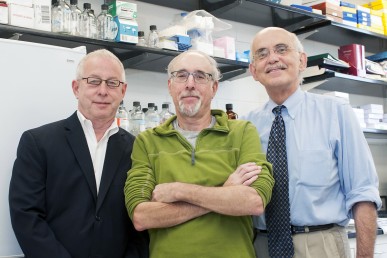Grant will fund development of chemical countermeasures
An interdisciplinary group of researchers at the University of Illinois at Chicago will investigate whether a therapy currently used to treat certain drug overdoses may be protective in the event of a chemical attack. The research will be supported by a five-year, $3.5 million CounterACT grant from the National Institutes of Health.

Guy Weinberg, professor of anesthesiology, Doug Feinstein, research professor of anesthesiology, and Rudi Rubinstein, professor of medicine, all in the UIC College of Medicine. Photo: Joshua Clark/UIC Photo Services (click on image for larger size)
Principal investigator on the grant is Douglas Feinstein, research professor of anesthesiology in the UIC College of Medicine. He and colleagues in the UIC colleges of Medicine, Engineering, and Pharmacy will study the efficacy of a high-fat liquid called a lipid emulsion for treating sudden exposure to fat-soluble compounds that could be used as chemical weapons.
The lipid emulsion they will study is already approved by the FDA as a nutritional supplement. It has also been used off-label to treat overdoses of fat-soluble drugs including anesthetics, beta blockers, calcium-channel blockers and certain antidepressants. The UIC researchers believe that the lipid emulsion may be effective against agents with potential for being weaponized, including a widely used rodenticide. They will also investigate whether lipid emulsion can prevent long-term neurological damage from chemical agents.
“Right now, lipid emulsion is given intravenously, but starting IVs and setting up to administer infusions for large numbers of people in an emergency scenario is impractical,” said Dr. Israel Rubinstein, professor of medicine in the UIC College of Medicine and a co-primary investigator on the grant.
The researchers are looking at delivering lipid emulsion as an injection into the bone marrow, which has a rich blood supply and should allow the emulsion to diffuse rapidly throughout the body.
“First responders can give shots of lipid emulsion to large numbers of people very quickly using a specialized injection device that looks a bit like a gun that can poke right through clothing,” said Feinstein.
“We are hoping that this grant is just the first step in establishing a chemical-countermeasures center here at UIC,” he said.
Dr. Guy Weinberg, professor of anesthesiology in the UIC College of Medicine and the discoverer of lipid-emulsion treatment for drug toxicity, is a co-primary investigator on the grant. He is also a staff physician at the Jesse Brown VA Medical Center, where Dr. Rubinstein is a staff physician and associate chief of staff. Dale Pelligrino, professor of anesthesiology in the UIC College of Medicine; Belinda Akpa, assistant professor of chemical engineering in the UIC College of Engineering; and Richard Van Breemen, professor of medicinal chemistry in the UIC College of Pharmacy; are also investigators on the grant.
The research is supported by NIH CounterACT grant 1U01NS083457-01.
